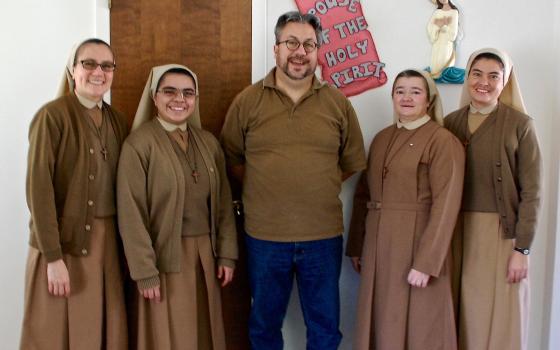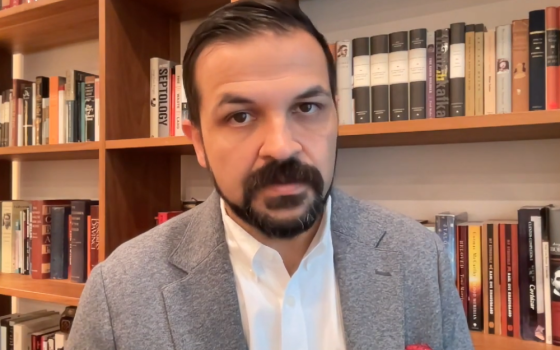THE SPIRITUALITY OF FASTING: REDISCOVERING A CHRISTIAN PRACTICE
By Charles M. Murphy
Published by Ave Maria Press, $12.95
Msgr. Charles M. Murphy says he is not trying to battle obesity in The Spirituality of Fasting. But that problem and others would benefit from his thesis that people need to rediscover rock-bottom moral values. Tracing the history of fasting, Murphy offers compelling reasons why fasting is good for the body and the soul.
Primary among them, fasting puts us in our place. As he explains, fasting teaches us humility before God. This allows us to see our interconnectedness with each other and with nature.
Author of several books, including Wallace Stevens: A Spiritual Poet in a Secular Age, Murphy approaches his subject eclectically. He discusses themes from contemporary authors such as Michael Pollan (The Omnivore’s Dilemma) and metaphysical poets such as George Herbert -- even citing Herbert’s poem “Love.” He covers the gamut from Tobit to Abraham, St. Paul to St. Augustine, St. Elizabeth Ann Seton to Simone de Beauvoir and Simone Weil.
Under less skillful hands, the book could be a confusing mishmash, but Murphy writes clear and engaging prose. Even so, given our consumerist tendencies, his book about fasting could be a hard sell. But this one should be required reading.
 PARADISE UNDER GLASS: AN AMATEUR CREATES A CONSERVATORY GARDEN
PARADISE UNDER GLASS: AN AMATEUR CREATES A CONSERVATORY GARDEN
By Ruth Kassinger
Published by William Morrow, $24.99
Why would Ruth Kassinger want her own indoor garden when she does not have a green thumb? Kassinger’s Paradise Under Glass offers several answers -- from midlife crisis, to empty nest syndrome, to the loss of her sister. Part memoir, part scientific and social history, the account is a compendium of some interesting and some not so interesting material related to gardening.
Author of science books for young adults, Kassinger includes a discussion of word etymologies, a history of indoor gardens and herbariums, as well as her own experience creating a conservatory replete with pool, butterflies and living wall. She even discusses the fascinating concept of paradise as envisioned by great minds from St. Augustine on. As Kassinger explains it, the word paradise comes from the Old Persian, apiri-daeza, meaning orchard surrounded by a wall. It is not synonymous with the Garden of Eden, which is helpful since Eden is considered allegorical, not factual, and many hope for paradise. Kassinger suggests she’s one of them.
With a style reminiscent of Susan Orlean (The Orchid Thief), Kassinger uses a narrative drive, concrete details, anecdotes and cliffhanger chapter endings to make her book more than merely a collection of flower facts.
 A YEAR WITH GOD: LIVING OUT THE SPIRITUAL DISCIPLINES
A YEAR WITH GOD: LIVING OUT THE SPIRITUAL DISCIPLINES
Edited by Richard J. Foster and Julia L. Roller
Published by HarperOne, $22.99
The editors of A Year With God highlight spiritual disciplines like fasting and prayer to help people center their lives on God in this book of 365 Bible verses, each with its own commentary.
Many commentaries include quotes from well-known religious writers. A few, such as the selection from Anne Morrow Lindbergh, offer platitudes and feel-good musings. More satisfying are contributions from Martin Luther, Teresa of Avila, Charles and John Wesley, and C.S. Lewis. Not to be missed are Soren Kierkegaard’s prayer (Day 341); Thomas Merton’s observations on the Psalms (Day 348); and Dietrich Bonhoeffer’s thoughts on Christian fellowship (Day 218), which echo this book’s reason for being: “The Christian needs another Christian who speaks God’s word to him. He needs him again and again ... for by himself he cannot help himself.”
Ultimately, the editors believe that good Bible study looks at texts close up and far away with insights from one feeding the other. With a combination of scholarship and insight, A Year With God does just that.
 NOAH’S COMPASS
NOAH’S COMPASS
By Anne Tyler
Published by Knopf, $25.95
Boy meets girl and falls in love. When he finds out that she’s already married, he tells her to get lost -- literally. It’s hard to imagine a contemporary novelist who would create such a plot. It’s harder still to believe that novelist is a Pulitzer Prize-winning author.
Yet Noah’s Compass, Anne Tyler’s 18th novel, tells just that kind of an improbable story. It proves, if nothing else, that human beings are more than the sum of their instincts and that a best-selling author is capable of paying her respects to such notions.
As one would expect of a Tyler novel, there’s much more to the tale than a character choosing to do the right thing. But ultimately, that’s Tyler’s point. Even when a 65-year-old finds not quite the woman of his dreams (but almost), he can act selflessly. He can rise above the quirkiness typical of Tyler’s characters and take on a certain decency.
This isn’t Tyler’s best novel. The dialogue isn’t quite as multifaceted as usual, and the plot at times seems slow. But even when Tyler is not at her best, she’s better than good enough.
 BROTHER ANDRÉ: FRIEND OF THE SUFFERING, APOSTLE OF SAINT JOSEPH
BROTHER ANDRÉ: FRIEND OF THE SUFFERING, APOSTLE OF SAINT JOSEPH
By Jean-Guy Dubuc
Published by Ave Maria Press, $16.95
 Alfred Bessette (1845-1937), aka Brother André, will be canonized on Oct. 17. The biography Brother André, by Fr. Jean-Guy Dubuc, introduces French-Canadian Bessette to an international audience.
Alfred Bessette (1845-1937), aka Brother André, will be canonized on Oct. 17. The biography Brother André, by Fr. Jean-Guy Dubuc, introduces French-Canadian Bessette to an international audience.
Born outside of Montreal, Bessette was orphaned when his widowed mother died of tuberculosis. He was barely literate when he entered the Congregation of the Holy Cross and took the name Brother André.
Working as a porter at Notre Dame College in Montreal, he was an unassuming man who had devotion to St. Joseph. Bessette also had compassion for the sick. It was as a healer that he gained his reputation as “the Miracle Worker of Montreal.” Hundreds of miracles were attributed to him. He, though, ascribed those miracles to St. Joseph and saw himself as merely an instrument.
Bessette had one ambition: to build a shrine to St. Joseph in Montreal. This he did despite huge odds, including his own illness and the 1931 stock market crash. Completed 30 years after his death, the shrine is a testimony to Bessette’s enduring faith. The book paints Bessette in broad strokes but manages to argue convincingly for his canonization.
[Diane Scharper is the author of Radiant Prayer/Poems. She teaches English at Towson University, Maryland.]



